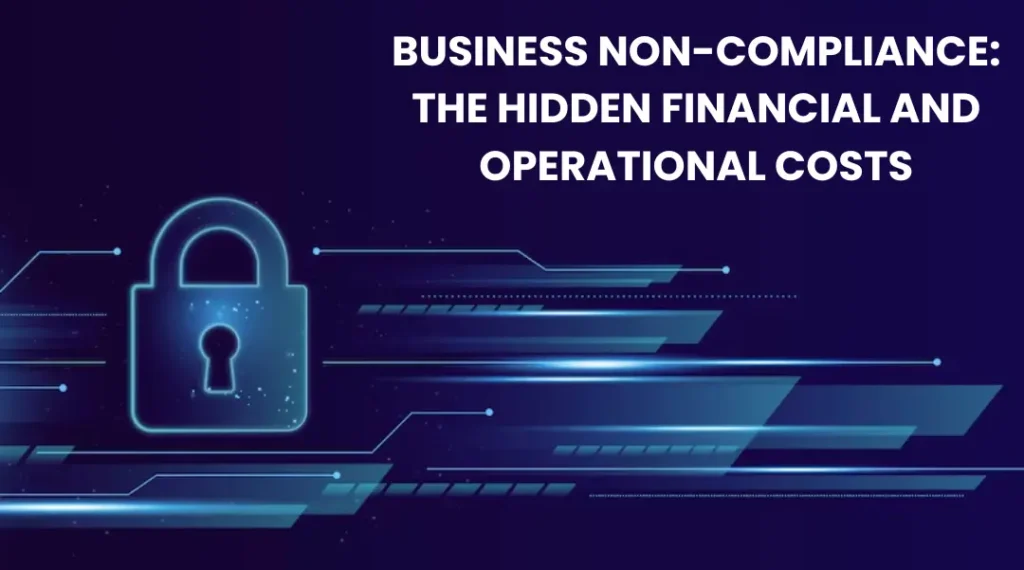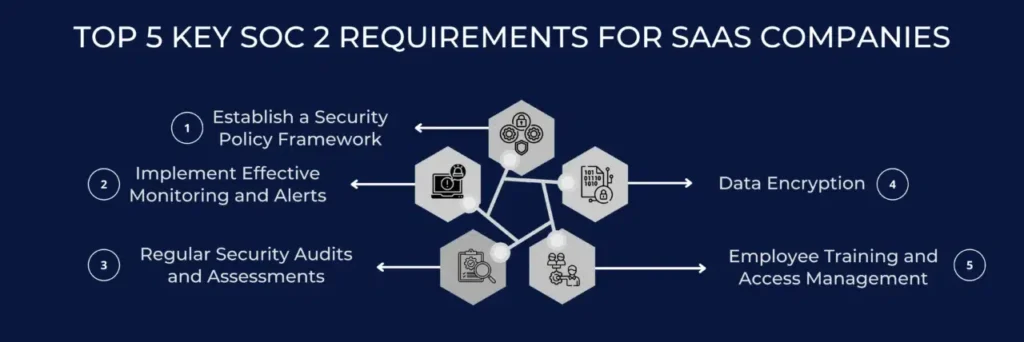
SOC 2 is a data security standard developed by the American Institute of Certified Public Accountants (AICPA). The standard offers the desired level of privacy and security regarding customer information. The rule is not mandatory, but it has multiple benefits for data security. In modern businesses, online data processes and transmission can make the data vulnerable and risky. Thus, the regulation guaranteed the protection and privacy of the customer’s data. Therefore, service organizations that provide online software services require SOC 2 reports to demonstrate their data security. SaaS companies also require the report to ensure their data’s secure storage and processing.
This blog will delve into the importance of SOC 2 for SaaS companies and the requirements of implementing the standard. Read the article to get more ideas about SOC 2 for SaaS.
IMPORTANCE OF SOC 2 COMPLIANCE FOR SAAS PROVIDERS
The real story is that cyber attackers are targeting SaaS applications, and most data breaches occur due to a lack of security in SaaS applications. Therefore, it is understandable that SOC 2 is essential for SaaS providers to secure their data and create customer trust. Let’s discuss some more importance in brief:
Build Customer Trust: Trust is the foundation of all businesses, especially client-provider businesses. Most companies ask for the providers’ proper security protocol before collaboration. Therefore, SaaS companies require adequate security measures to ensure business growth. In this regard, SOC 2 assures customers of adherence to high data security practices that positively impact their risk management and compliance process.
Align with Industry Best Practices: SaaS companies should maintain stringent security processes to adhere to the highest security standards. This sets benchmarks for excellent data security and integrity. In addition, the standard requires continuous audits and advancement of security protocols. It offers protection against evolving threats and security concerns. Thus, compliance creates a proactive approach to maintaining resilience against data breaches.
Provide Competitive Advantages: Attracting and retaining customers for a long time is critical in the crowded business market. Thus, SOC 2 compliance considers achievement and trust factors for SaaS businesses. It can attract clients and signify that the organization is serious about its security. A report on SaaS regarding SOC 2 suggested that a lack of continuity of compliance reduces the business significantly. Hence, strengthen your business with compliance practices.
Improve Risk Management: It is well-recognized that the compliance process enhances the security measures of SaaS companies. It also protects data from unauthorized access, and continuous monitoring mitigates emerging risks. Consequently, the compliance process allows SaaS providers to identify potential risks, take preventive measures, and diminish the chances of security incidents.
Enhance Reliability and Performance: Compliance enhances the system’s performance and reliability. In addition, it encourages SaaS providers to optimize their infrastructure and operational processes to continue providing services. Thus, the standard helps maintain service quality and reduces data downtime. These facts have a profound impact on customer satisfaction and trust.
Increase Transparency and Accountability: It offers transparency and accountability in the operation process. The audit report suggested that SaaS organizations follow strict data security protocols that benefit clients. Transparency helps to create trust among customers and stakeholders and assures them of operational integrity and data protection facilities.
TOP 5 KEY SOC 2 REQUIREMENTS FOR SAAS COMPANIES
The common requirements of SOC 2 compliance can vary per the organization’s needs and demands. However, some of the standard requirements are described below:
1. Establish a Security Policy Framework: At the initial stage, understand the importance of compliance in SaaS companies. Implementing a robust framework in data security prevents unauthorized access to data and ensures data safety. Effective controls for strengthening the security protocol are essential. Furthermore, SaaS-based companies require a standard for eliminating the risk of data breaches and providing confidence to clients.
2. Implement Effective Monitoring and Alerts: Compliance requires continuous monitoring and advancement to mitigate potential threats. In addition, continuous monitoring systems identify vulnerabilities in the process and respond to such incidents. In this regard, automated alert systems can be an effective measure in identifying potential threats. The alert informs the concerned authority about detecting threats in the process, which helps in strategies for the cope-up mechanism.
3. Regular Security Audits and Assessments: Compliance mandates continuous reviews of security protocols to assess the effectiveness of the controls. In addition, the process ensures data security in SaaS organizations. The periodic reviews identify potential weaknesses and fix the flaws. Therefore, they reduce the risk of data breaches and cyber threats. The process assures the clients about the data safety measures of SaaS providers.
4. Data Encryption: Encryption is essential during the transmission and storage of private data. It ensures data safety in the fragile cyber world. The process restricts data handling and prevents unauthorized access to data. In addition, restricted data handling process improves the quality of services. Thus, SaaS industries require encryption to maintain data privacy and create customer trust.
5. Employee Training and Access Management: Employee training is essential for strengthening the security protocol. It educates the employees about adequate data security compliance behavior. In addition, implementing multi-factor authentication and data access control limits unnecessary exposure of sensitive data.

HOW TO ACHIEVE THE DATA SECURITY COMPLIANCE: A STEP-BY-STEP GUIDE
SOC 2 auditors review your security systems and give their SOC 2 attestation to your compliance stance. But first, you need to know about getting SOC 2 certification.
Select the TSCs: It is essential to know and remember that the trust standards do not require you to meet all their requirements. Security is a common TSC among the five, and keeping information safe from people is necessary. Suppose your organization stores customers’ data; then privacy is the prime concern for your organization. On the other hand, if organizations manage customers’ financial information, then process integrity will be the prime concern. In SaaS, providing data availability to customers is essential.
Define the Scope: Once you know what kind of report you need to make, the next step is to describe the scope of your audit. Thus, it determines the necessary TSCs for your business based on your services and clients’ demands. It is essential to balance the audit scope and the cost of the process. Therefore, work closely with an experienced auditor to develop a plan that meets your business goals.
Conduct an Internal Risk Assessment: It finds and records business-specific risks before starting the audit process. Unauthorized access to customer data kept on your servers, system downtime due to hardware failure or network problems, and not following the laws and rules that apply are all examples of these kinds of risks. Therefore, rank each risk based on its occurrence and effects. Then, you can use this information to develop and implement the right ways to lower the risk.
Undergo Readiness Assessments: To ensure the organization is ready for the official SOC 2 audit, you should first assess your readiness. An external auditor will review your IT environment and rate how well it meets the SOC 2 standards as part of a readiness assessment. In addition, a readiness review lets you find and fix any problems before the actual audit. The evaluation results help you make the needed changes to improve your chances of getting the report.
Perform Gap Analysis and Remediation: Understand your organization’s security rules and find the gaps in the process. In this section, you will make the changes and updates you need to fill in those holes. This could mean making changes to your rules, workflows, or controls that are right for the stage. Being careful and following a plan is essential here. It ensures that you meet all the requirements and that your controls achieve the desired outputs.
Choosing the Right Auditor: It is time for the SOC 2 audit by an independent, AICPA-certified auditor. Select an auditor who knows your business because their knowledge can affect the audit process and result. During the audit, the auditors will ask for documents about different parts of your company’s controls. Prepare to back up your answers to their questions with clear and concise proof. The audit process will go more smoothly if your documentation is well-organized and complete. After the audit is over, the auditor will give you a full audit report that includes their results and any suggestions for how to make things better.
SOC 2 audit by a Certified CPA: You need an external auditor to review your security controls and processes. During the audit, you must show proof of different policies, processes, and technical controls. You can expect to talk back and forth with the reviewer a lot. People will ask you for more proof of missing leads. After reviewing all the documents, your organization will get a SOC 2 audit report if the auditor is satisfied.
HOW SERVEISO CAN HELP THE SAAS COMPANIES
One of the hardest things to do is ensure SOC 2 compliance. Serve Iso’s services make it easier. Serve Iso’s effort and guidance make it easy for companies to show that they meet SOC 2 standards for device security, access control, and more. In addition, our expert auditors help clients achieve compliance requirements, offer employee training, and implement the correct controls. We understand that implementing compliance is difficult, but maintaining compliance is far more complex. Therefore, with Serveiso’s assistance and help, you can hold your position in the competitive market. Our cost-effective approaches and long history of successful implementation of data security compliance can help SaaS providers stay competitive, so you should consider compliance implementation for your organization. You can visit serveiso.com for more precise guidance.
